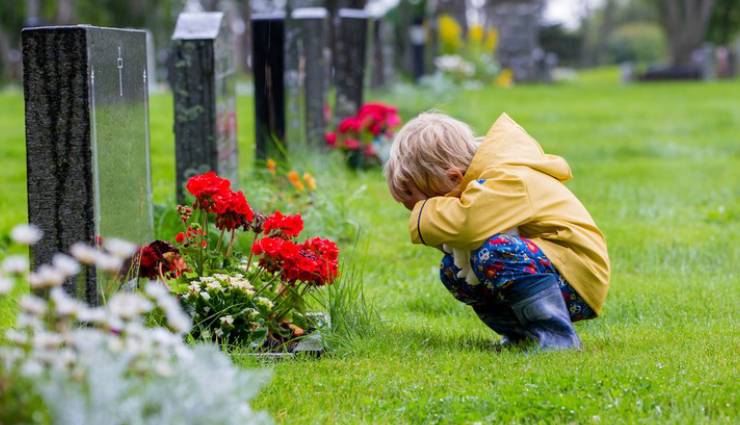The death of loved ones is an inevitable and painful part of life. Unfortunately, it is not in our hands when our family experiences this grief, and it is not always possible to protect children from the reality of death. Children should learn that it is normal to deal with the suffering of the end of loved ones and that there are ways to deal with it. In the following, we explain how to talk about death with children of different ages.
Why is it important to talk about death with children?
According to research, children whose parents were more interested in discussing the topic of death have a better understanding of the end of life and its true meaning. Children around three can understand that death is a regular occurrence. In the following years, they realize more and more that everyone dies and that death results from the cessation of vital functions of the human body.
Losing a loved one can become traumatic and change people’s lives. Children often cope best with direct, honest, and frank explanations of the concept of death by parents. This method helps them feel safe and supported when they lose their loved ones.
Some psychotherapists believe that talking about death with children of any age may help them understand and digest the concept. This method teaches children how to deal with sadness, making them less likely to experience fear, anxiety, and confusing emotions.
Why is it difficult to talk about death with children?
Telling your child that someone they love or know has died is difficult because no parent expects this to happen. In addition, the difficulty is compounded by your grief and worry about how the news will spread, how much your child will understand, and whether you can answer their questions.
The death of loved ones may be due to a long-term illness or a sudden and tragic accident. In the first case, we can think about possible solutions so that our child is prepared to hear the bitter news, but in the second case, it becomes a little more complicated. Therefore, we must introduce the child to concepts such as death at an appropriate age.
The best time to talk to children about death
Usually, you can start talking about death with children when they are three years old. At this age, most children understand that death is an irreversible event. However, they may not be able to understand precisely why this happened.
To start a conversation about death, start with a smaller story, such as the death of a pet, a bug on the sidewalk, or a fictional character in a children’s storybook. Feeling comfortable talking about death and talking about it early can help children cope more quickly when they experience the end of a loved one. Also, by doing this, they realize there is nothing wrong with starting a conversation and talking about death.
Whether someone in your family has recently died or is imminent, you should talk to your children about it as soon as possible. Children are highly intuitive and closely observe the behavior of adults close to them. If their routine changes, other people take care of them, or family members behave differently, these are all clues to children that something has happened. In this situation, you should open the conversation sooner. Please don’t leave children wondering what happened or why others hid something.
How to explain death to your child?

Death is a part of life, so you need to help children get used to the fact that sometimes people die. The truth is, nothing makes talking about death easier with children. However, paying attention to 8 important points for this conversation is better.
1. Be precise and do not use metaphors
Talking about death is difficult even as an adult. Some prefer phrases like “the past” or “the journey to the land remains” to make the subject seem more pleasant. Although it may be respectful to use these terms, children need to hear clear explanations about such matters.
Using metaphorical expressions for younger children may confuse them, and they cannot understand the concept of death well. In addition, some children may feel you are lying to them or hiding the truth. So honesty and openness will always benefit you in the long run.
Use direct words like “dead” or “death” when talking to the child. You must make the child understand that the deceased will not return. It is even better to discuss what happened in the physical world before discussing religious and spiritual beliefs about death. According to research, a child’s understanding of the mundane issues of death is most important. He may later think about or hear spiritual beliefs about death.
2. Describe the details according to the child’s age
Young children must know the deceased person’s life is over and cannot be returned. When children enter elementary school, they can understand that death means ceasing vital bodily functions such as heartbeat or breathing. Teenagers will likely want to know more about how an illness or accident leads to death.
Children’s growth and intellectual maturity are different. If you’re unsure what’s appropriate for your child’s age, start with the basics and keep the conversation going. First, ask him questions to determine how much he knows about death. Some children hear about death online or at school. Your child’s answers to your questions will help you gauge how much he knows about death.
3. Give the child a chance to ask questions
Children are naturally curious and may have questions about death. You can start a conversation about death with questions like these:
- What do you think will happen to Grandpa?
- Where do you think grandfather went?
With the help of such questions, you can understand your child’s concerns and solve all his worries or misunderstandings. Then let the child ask all the possible questions, even if you don’t have answers to them.
4. Prepare the child for the mourning ceremony
Tell the children what will happen soon so they know what to expect. For example, tell them: “We are going to the funeral tomorrow. Many people there. Most of the people there cry, and there are people who you may not know, but they talk to you.”
You can also explain what they see there, such as the bouquets, the coffin, and the deceased’s body, and what others may be doing, such as crying and hugging, to help them understand what is to come.
5. Let the child decide for himself
Talking about what will happen shortly and the funeral allows the child to choose whether to attend or participate. It would be best not to force the child to do something he does not want. This applies to all stages of the ceremony. For example, he may not want to see the body and may even want to wait in another place until the ceremony is over. So let him decide for himself.
6. Try not to transfer your feelings to the child

You have probably ever been to a funeral where the adults cry, and the children laugh and play a little further. This reaction is normal for children. In more straightforward language, adults have more life experience than children, and we should not expect children to know or understand the reason for everything we do.
However, allowing the child to express his true feelings would be best. The issues that most children face when their loved ones die are:
- increased generalized anxiety or separation anxiety ;
- excessive dependence on parents;
- I am changing my sleeping and eating patterns.
It is suitable for children to see your feelings and emotional reactions, but you should not talk too much about unpleasant feelings so they do not get into the problems we mentioned.
7. Give the child a sense of security
Death can be a scary thing for a child. Children often have doubts about death. As a parent, you must constantly remind them that it is okay to have different feelings. Reassure them that it’s not their fault, even if you think they know it. Let them know that you are always there for them and that they are safe.
8. Ask a mental health counselor for help
You don’t have to deal with the problem alone. No one expects that from you. If this is beyond your control, go to a professional child psychologist. He can help your child spend a problematic time better and deal with the issue of the death of loved ones more easily.
Questions the child is likely to ask
Death has many unknowns. Therefore, it is not strange that the child has many questions. Young children often ask questions about whether the deceased will return. Elementary school children ask more realistic questions, such as how to stop body activity. Teenagers are more curious about specific diseases or physical injuries.
If the child does not ask you questions about death, do not pressure him. Just remind him that he can always come to you to answer his questions.
you say
Although challenging, talk openly and honestly with children about death. If there is a death in your family and you hide it from the children, they may suffer more in the long run. Children who do not find answers to their questions often draw their conclusions based on incorrect information. So you have to find a way to talk to them. Isn’t it?
Warning! This article is only for educational purposes; to use it, it is necessary to consult a doctor or specialist.



